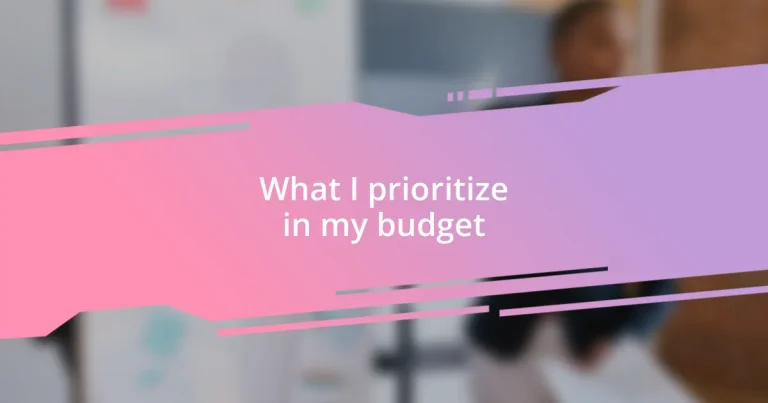Key takeaways:
- Understanding budget priorities is vital for financial stability; needs should take precedence over wants, and allocating savings for emergencies is essential.
- Setting clear short- and long-term financial goals motivates smarter spending and helps prioritize resources toward meaningful experiences.
- Regularly reviewing and revising the budget while adjusting for lifestyle changes enhances financial management and ensures alignment with personal values and goals.
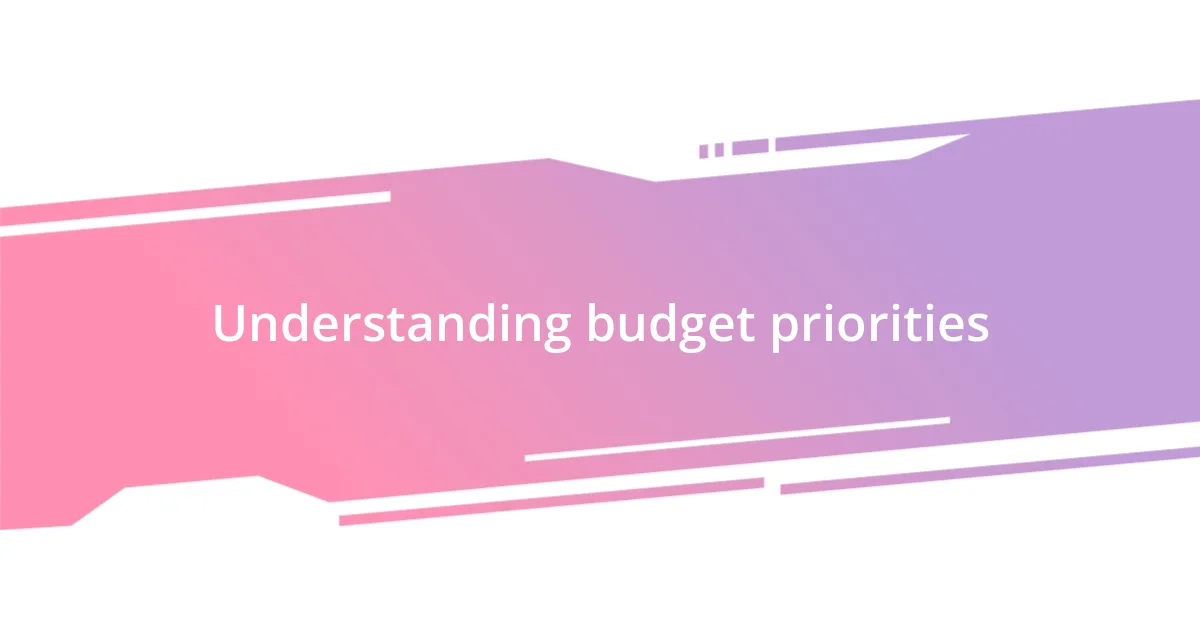
Understanding budget priorities
Understanding budget priorities is essential for achieving financial stability. For instance, I remember my early days of budgeting, feeling overwhelmed by various expenses. I quickly learned that prioritizing needs over wants made a significant difference; it’s a classic yet impactful realization.
When assessing what should take precedence in your budget, I often ask myself, “What will genuinely enhance my quality of life?” This simple question directs my focus towards essentials like housing, food, and savings for emergencies. I’ve been in situations where unexpected expenses arose, and I was grateful for having allocated funds for savings rather than splurging on non-essentials.
It’s interesting how our budget choices reflect not just our financial goals but our values as well. I once spent a good chunk of my budget on a wellness retreat. While it felt indulgent, it turned out to be an investment in my mental health, demonstrating that sometimes, prioritizing self-care can yield greater benefits down the line. What are the unexpected ways you find joy in your budget?
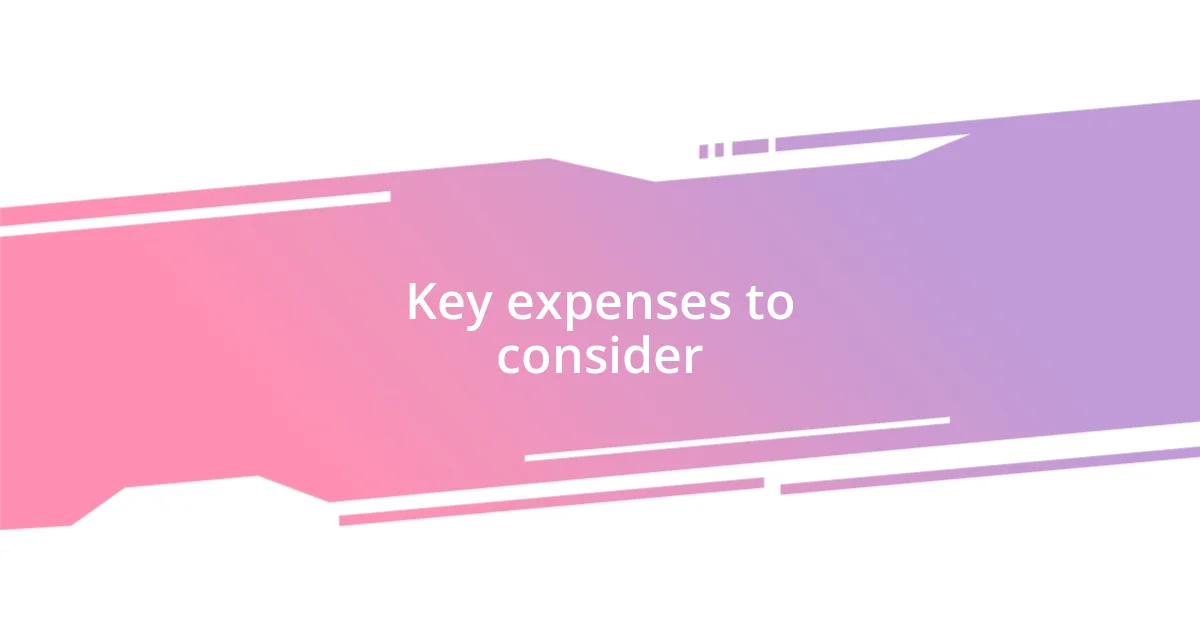
Key expenses to consider
When it comes to budgeting, I’ve come to realize that distinguishing between fixed and variable expenses is crucial. Fixed expenses, such as rent or mortgage payments, are non-negotiable and must be prioritized for a stable financial foundation. On the other hand, variable expenses—like dining out or entertainment—can often be adjusted based on my current financial situation.
Here are some key expenses that deserve careful consideration:
- Housing Costs: Rent or mortgage should always be at the top of the list.
- Utilities: This includes electricity, water, and internet—essential for daily living.
- Groceries: Prioritize healthy and budget-friendly foods over takeout.
- Transportation: Whether it’s public transit or car maintenance, plan for necessary travel costs.
- Savings: Set aside funds each month for emergencies and future goals.
- Insurance: Health, auto, and home insurance are critical in protecting your assets.
Reflecting on my own journey, I once overlooked how much my utilities fluctuated from month to month. This made budgeting challenging until I decided to create a monthly average. By doing so, I not only stabilized my cash flow but also mentally eased the strain of unexpected bills. It’s those little adjustments that can have a profound impact on overall financial well-being.
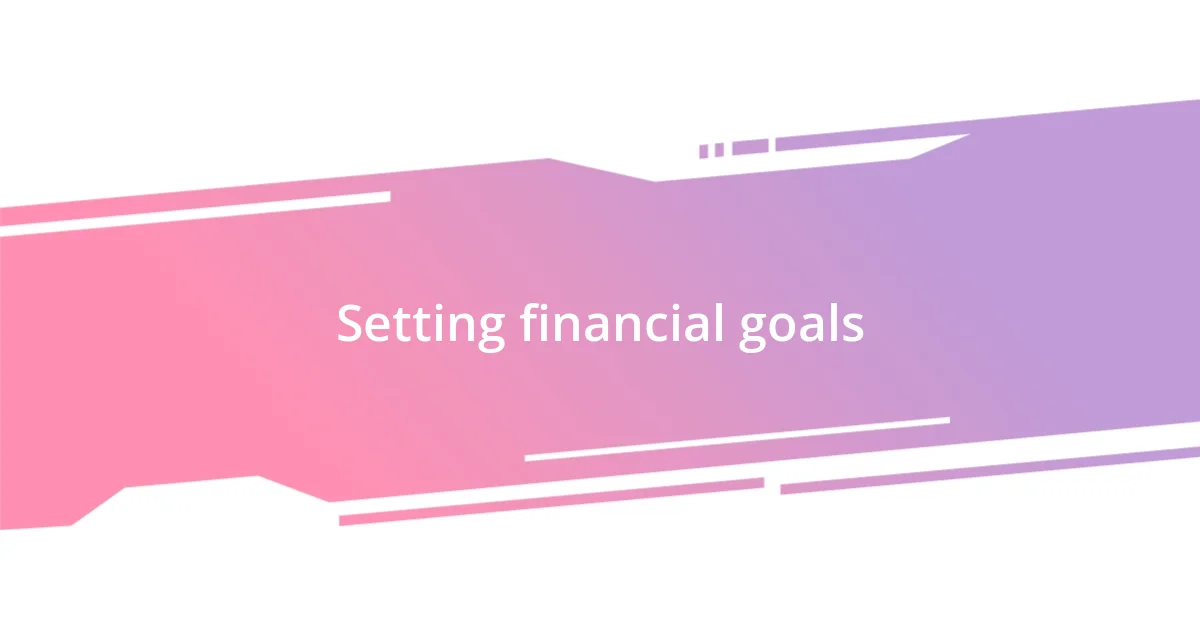
Setting financial goals
Setting financial goals is a game changer when it comes to budgeting. I often think back to a time when I didn’t have clear financial objectives. I felt like I was running in circles, unsure of where my money was going. Once I started setting specific goals, it was like turning on a light in a dark room. Suddenly, I could see the path forward, whether it was saving for a vacation or building an emergency fund.
In my experience, having both short- and long-term goals can significantly shape your budgeting strategy. Short-term goals might include saving for a new laptop or a weekend getaway, while long-term goals could be buying a house or retiring comfortably. It’s interesting how setting these targets not only motivates me to save, but it also helps me make smarter financial decisions. When tempted by a spontaneous dinner out, I pause and ask myself if this aligns with my goals. If it doesn’t, more often than not, I choose to skip it.
Creating and revisiting my financial goals has truly transformed how I view my expenses. It’s not just about cutting costs; it’s about allocating resources toward things that bring me joy and security. I remember telling myself that every dollar spent is a decision, and that realization hit hard. I now value each dollar in the context of my goals, allowing me to invest in what truly matters to me. What about you—what motivates you to stay on track with your financial goals?
| Goal Type | Time Frame |
|---|---|
| Short-Term Goals | 1-12 months |
| Long-Term Goals | 1-5+ years |
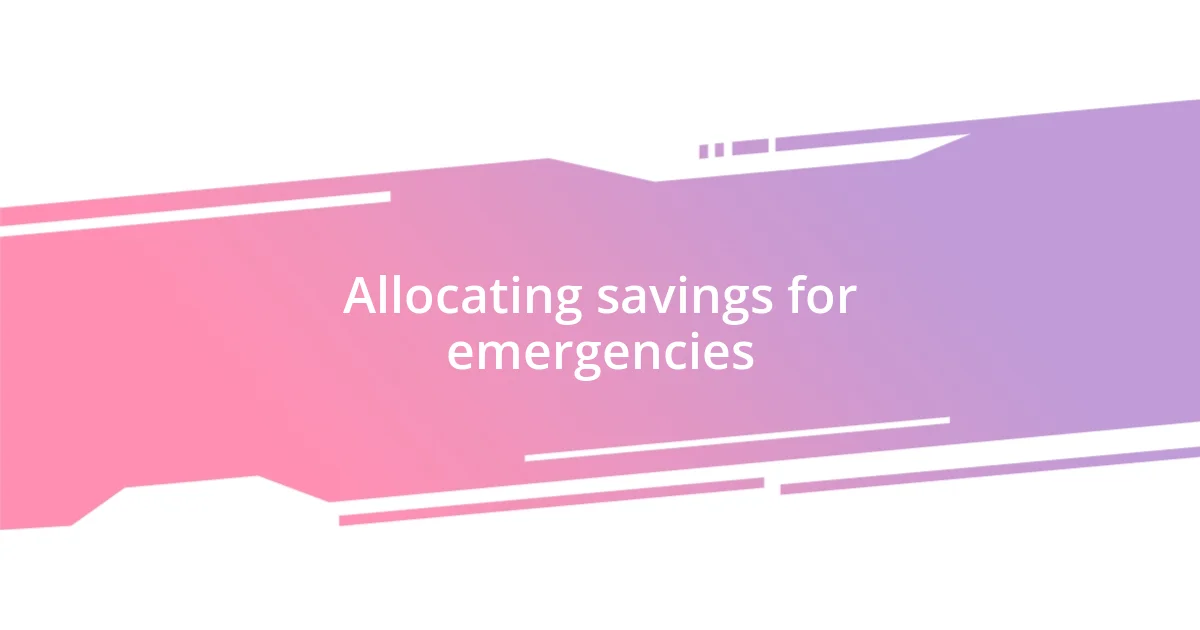
Allocating savings for emergencies
Allocating savings for emergencies is something I’ve grown to see as non-negotiable. It wasn’t always this way; there was a time when unexpected expenses turned my budget into chaos. After an unexpected car repair wiped out my discretionary funds, I finally understood the value of an emergency fund. Now, I aim to save at least three to six months’ worth of living expenses, providing me with peace of mind that I can navigate life’s surprises without derailing my financial stability.
I recall a moment when I faced an urgent situation—not long after I decided to prioritize my emergency savings. My refrigerator broke down unexpectedly, leaving me with spoiled food and the need for an immediate replacement. Thanks to my emergency fund, I could buy a new fridge without stressing about how it would impact my other bills. This experience reinforced how crucial it is to have that financial cushion. It’s as if my past self is cheering me on, reminding me that being prepared can save you from anxiety and financial strain.
Now, when I sit down to budget each month, I allocate a portion for emergencies before considering my discretionary spending. It’s fascinating how much simpler life becomes when I know I’m prepared for the unexpected. Do you have a plan for handling emergencies in your budget? I genuinely believe that creating this safety net not only bolsters your finances but also contributes to a more relaxed and confident approach to life.
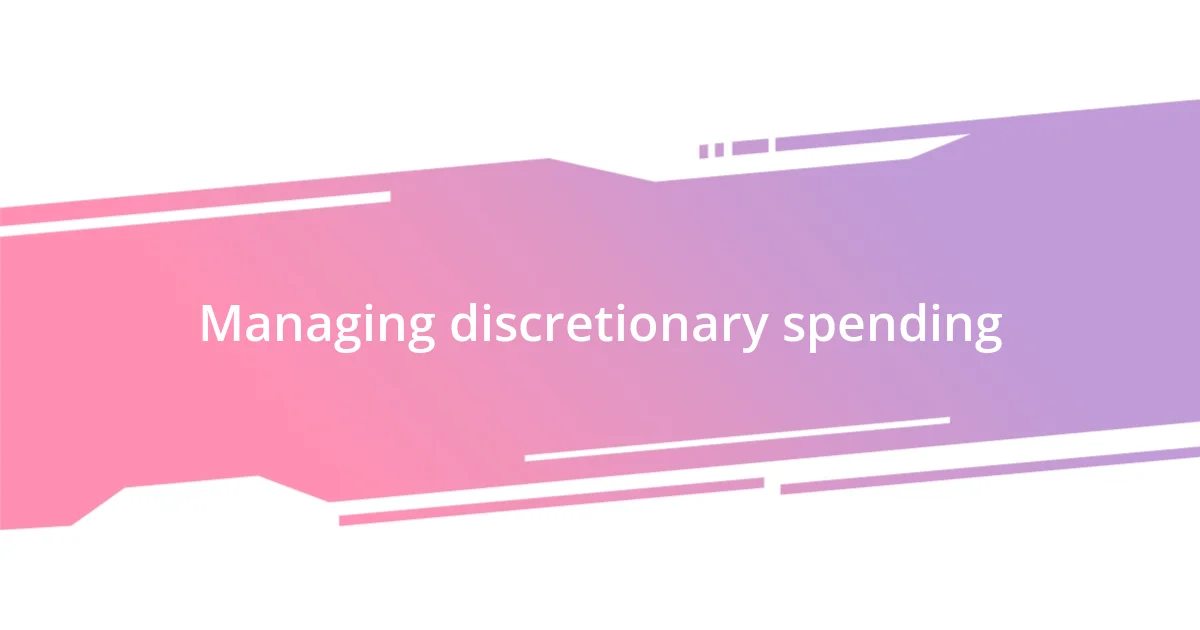
Managing discretionary spending
Managing discretionary spending can often feel daunting, especially when you want to enjoy life while ensuring your financial health. I’ve found that, rather than cutting out all fun expenses, it helps to prioritize where I direct my discretionary dollars. For example, I once calculated how much I was spending on coffee each month. It was surprising to see it add up! Now, I treat myself to my favorite café occasionally but also invest in quality coffee at home, balancing indulgence with savings.
Another approach that’s worked for me is setting limits for different categories. I categorize my discretionary spending into entertainment, dining, and hobbies. This way, I can enjoy a concert or dine out guilt-free, knowing I have a defined budget. I vividly remember planning for a show I was dying to see. By allocating a specific amount ahead of time, I avoided any last-minute scrambles or overspending that would disrupt my budget. It’s a relief to enjoy what I love without financial anxiety hovering over me.
Reflecting on my discretionary spending habits also helps me identify what truly brings me joy. I recall a time when I splurged on a weekend trip, and it was amazing, but I didn’t feel as great about it when I realized it meant dipping into savings for other priorities. Now, I make it a point to weigh every discretionary purchase against how much happiness it’ll bring. It’s a simple but effective practice. Do you ever pause to consider which expenses genuinely enhance your life? Each choice can be a meaningful one, and with a bit of mindfulness, you can enjoy your spending while staying on track with your goals.
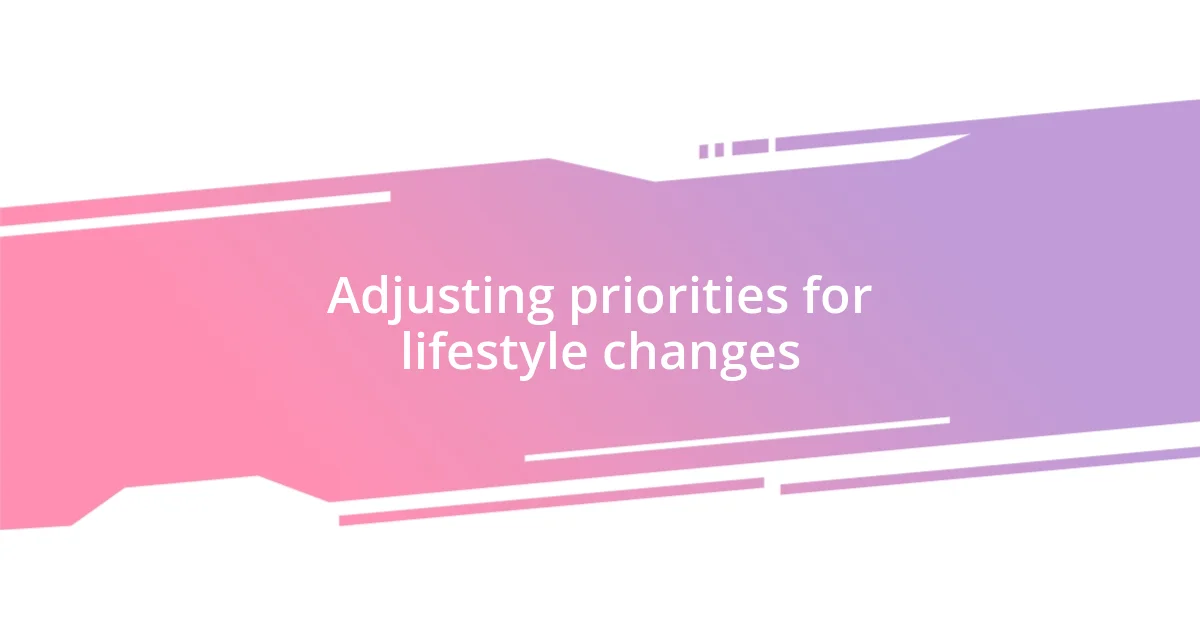
Adjusting priorities for lifestyle changes
Adjusting priorities in my budget has become essential whenever I encounter lifestyle changes—like moving to a new city or starting a new job. When I relocated, my commuting costs increased dramatically, so I shifted my budget to allocate more towards transportation and less towards dining out. It was a practical adjustment that allowed me to enjoy my new surroundings without financial stress, but it also made me think: how can I maintain that balance when life changes come my way?
I remember when I decided to focus on my health; I began prioritizing organic groceries and a gym membership. At first, the adjustments felt overwhelming, but I noticed that reallocating my budget gave me more energy and motivation. It was worth it because this investment in my well-being made me feel physically and emotionally fulfilled. Have you ever noticed how a slight increase in one budget category can lead to significant positive change in your life?
More recently, as I embraced remote work, I found myself needing to upgrade my home office. I allocated funds initially set aside for weekend outings to invest in a good chair and desk, ensuring my space was comfortable and productive. This change not only improved my work efficiency but also left me feeling more satisfied during my work hours. It’s amazing how adjusting financial priorities can lead to a deeper connection with your lifestyle. What adjustments will you make to align your budget with your new life circumstances?
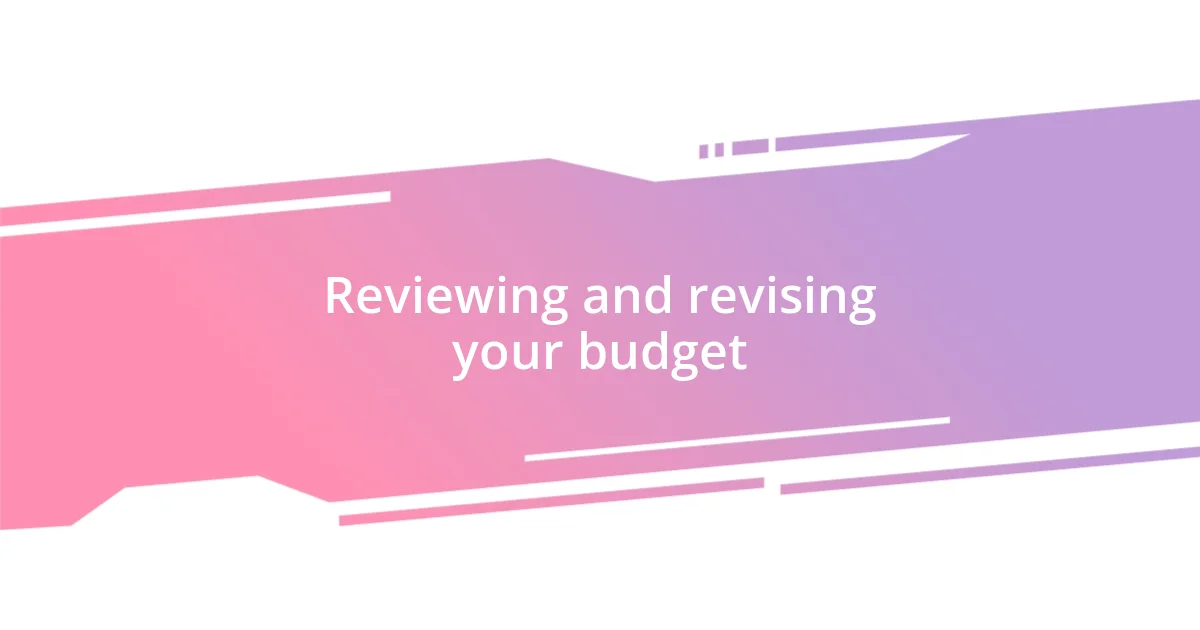
Reviewing and revising your budget
When it comes to reviewing and revising my budget, I find it’s important to regularly reflect on my spending habits. I like to sit down at the start of each month and review what I spent the previous month. I remember a time when I discovered my grocery bill had skyrocketed. By reflecting on my choices, I recognized I was buying too many impulse snacks. This realization prompted me to plan meals and stick to a list, saving both money and waistline.
In my experience, practicality is key when updating my budget. Alongside the review, I reassess my goals and any upcoming expenses—like a family event or a trip. Recently, I faced a dilemma when planning for a friend’s wedding. I allocated funds for gifts, travel, and attire, but it meant cutting back on my entertainment budget. This kind of prioritization reminds me: Are my financial choices aligning with what truly matters to me?
One technique that has worked wonders for me is tracking my spending through apps or spreadsheets. I vividly recall a period when I relied solely on memory, and it didn’t end well! After a few alarming bank statements, I started logging every expense. The personal connection this brings fosters a sense of accountability. Have you ever found the act of tracking your spending eye-opening? I certainly did—it transformed how I viewed my finances and helped me make more informed decisions moving forward.












